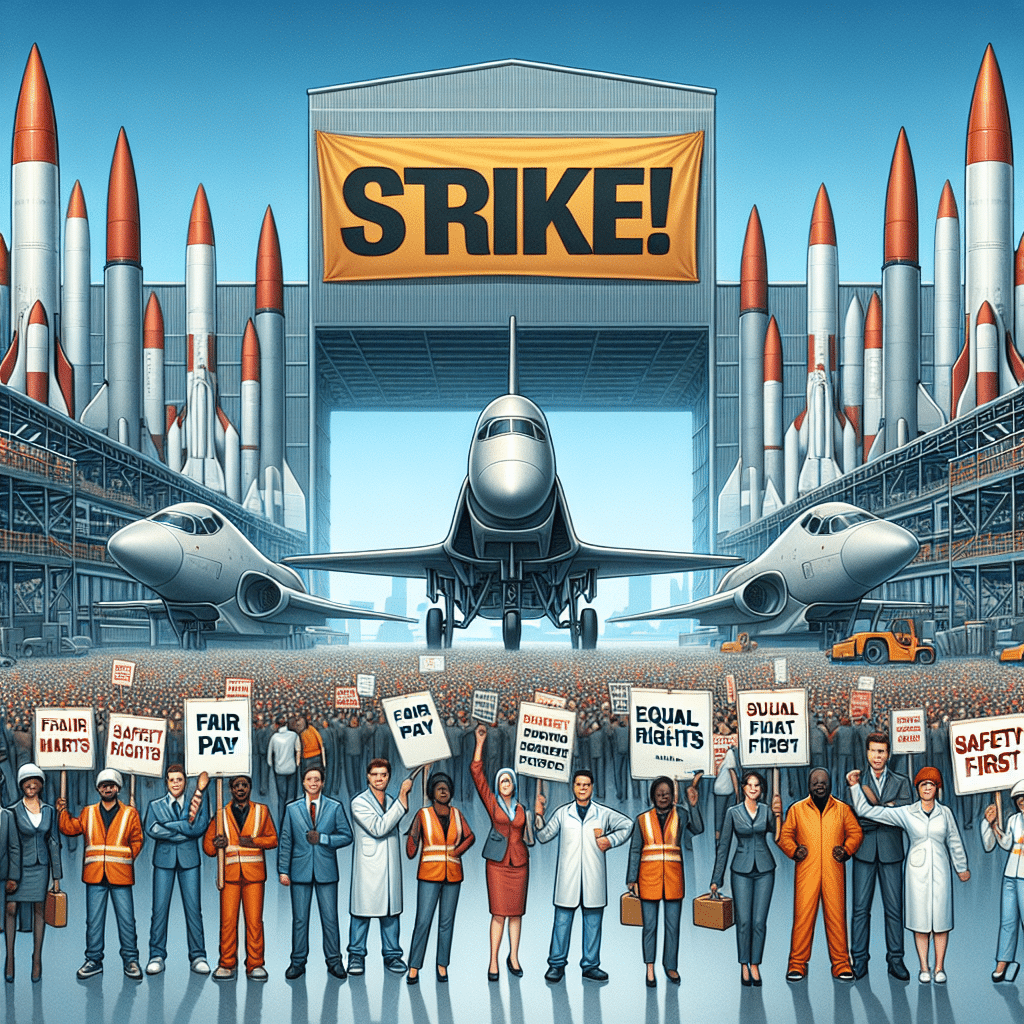Defense Workers’ Strike at Boeing Escalates: What This Standoff Means for the Aerospace Industry and Investors
Boeing’s Missouri Strike: A Wake-Up Call for Investors and Industry Insiders
In a rare labor showdown not seen in nearly 30 years, over 3,000 Boeing defense workers in Missouri have decisively rejected the company’s latest contract offer, signaling intensified friction that could ripple across the aerospace sector and investor portfolios alike. This strike, centered at Boeing’s St. Louis facilities where critical F-15 fighter jets and missile systems are assembled, underscores a growing labor assertiveness amid soaring demand for defense and aerospace products.
What’s Happening?
The International Association of Machinists and Aerospace Workers (IAM) reported that despite a tentative five-year deal promising a hefty 45% average wage increase—lifting average pay from $75,000 to $109,000—workers voted “no.” Their core grievances? Insufficient signing bonuses and inadequate enhancements to 401(k) retirement benefits, which they view as essential recognition of their skill and sacrifice. IAM International President Brian Bryant emphasized that Boeing’s “half-measures” won’t cut it, demanding a contract that truly respects the workforce.
From Boeing’s perspective, the company has maintained a firm stance. Dan Gillian, Boeing’s Air Dominance VP, stated no further negotiations are scheduled and highlighted the company’s contingency plan to hire permanent replacement workers, aiming to fulfill rising demand despite the labor disruption.
Why Should Investors Care?
This strike is more than a localized labor dispute—it’s a bellwether for several critical trends:
-
Labor Market Tightness in Aerospace: Skilled aerospace workers are asserting their bargaining power amid a tight labor market. With defense budgets climbing globally, companies like Boeing face mounting pressure to retain and fairly compensate talent. Investors should watch for potential ripple effects on production timelines and costs.
-
Rising Costs and Margin Pressures: The proposed wage increases and benefits enhancements, if eventually accepted, will raise Boeing’s labor costs significantly. This could compress margins in an industry already grappling with supply chain challenges and inflationary pressures.
-
Supply Chain and Production Risks: The strike threatens to delay delivery of key military aircraft, potentially disrupting Boeing’s revenue recognition and contractual obligations. This operational risk factor should be factored into investor models and risk assessments.
Unique Insight: The Retirement Benefits Factor
While wage hikes grab headlines, the union’s focus on 401(k) improvements is a subtle but critical indicator of broader workforce priorities. As noted in a recent PwC survey, 65% of workers across industries now prioritize retirement benefits as much as immediate pay raises. Boeing’s failure to adequately address this signals a disconnect that could prolong labor unrest and hint at deeper cultural and strategic misalignments within the company.
What Should Investors and Advisors Do Differently?
-
Reassess Boeing’s Risk Profile: Investors should incorporate the potential for prolonged labor disputes and rising operating costs into Boeing’s valuation models. This includes stress-testing scenarios where wage pressures persist or supply chain disruptions extend.
-
Monitor Defense Sector Labor Trends: Labor unrest at Boeing may presage similar challenges at other defense contractors. Advisors should diversify exposure and consider companies with stronger labor relations or more automated production processes.
-
Engage on ESG and Labor Practices: For ESG-focused investors, Boeing’s handling of this strike is a critical case study. Active engagement with corporate governance on labor relations and workforce sustainability could mitigate long-term risks.
What’s Next?
Given Boeing’s current refusal to reopen talks and the union’s firm stance, expect the strike to continue into the near term. Watch for potential government intervention, especially given the strategic importance of defense manufacturing. Additionally, keep an eye on how Boeing’s competitors respond—this could catalyze a broader industry shift toward better labor agreements or accelerated automation investments.
Final Thought
This strike is a stark reminder that in today’s market, labor dynamics are as pivotal as technological innovation. Investors who understand and anticipate these human factors will gain an edge in navigating the complex aerospace and defense landscape.
For a detailed deep dive into how labor trends are reshaping aerospace valuations and what this means for your portfolio, stay tuned to Extreme Investor Network—where insight meets action.
Sources:
- International Association of Machinists and Aerospace Workers (IAM) statements
- Boeing corporate communications
- PwC 2024 Employee Financial Wellness Survey
- CNBC Pro analysis on aerospace labor trends
Source: Striking defense workers reject Boeing contract offer







